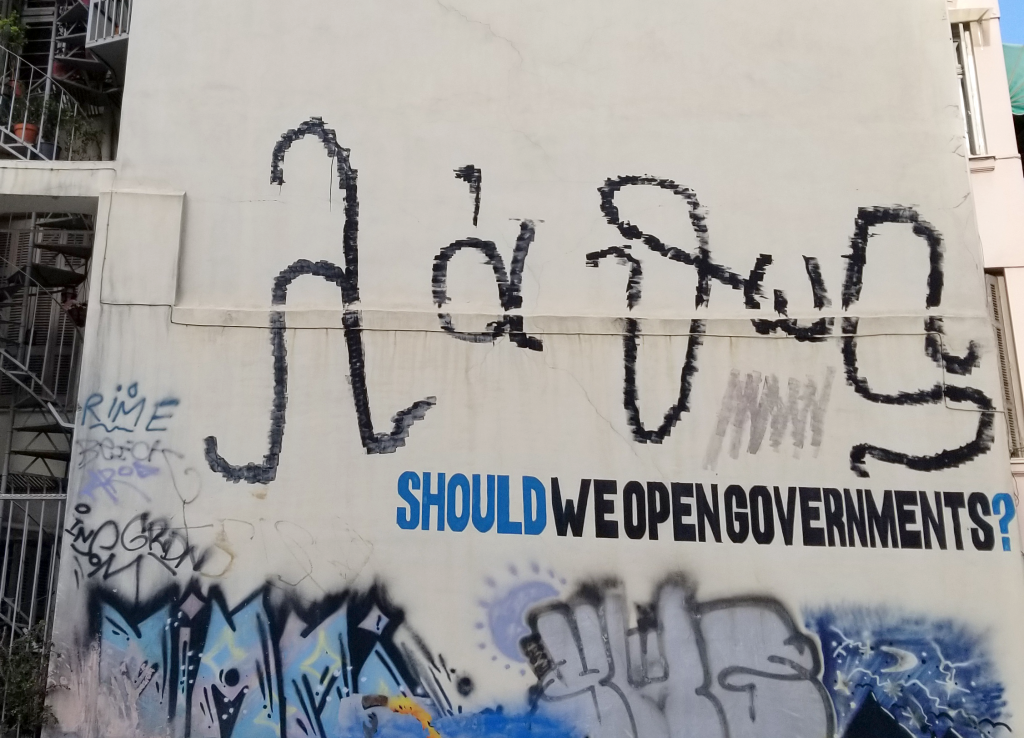In November 2019, we were in Athens for our third mobility. There, we meet the leaders of the SynAthina project, a platform to mobilize citizen initiatives in the city. Before going any further, let’s quickly describe the context. In Greek, “commons” is called koinos, and the concept was already in use during antiquity. But today, what do the Greek commons look like? We arrived in Athens on November 18 for this 4th trip organized within the framework of Enacting the Commons with this question in mind. Before answering, it is essential to measure the extreme character of Greek society, and this for several decades: a very fragmented territory and located on major seismic faults, young institutions weakened by corruption and the clientelism, a succession of crises ranging from the civil war to the dictatorship of the Colonels, and to close the picture, the sudden transition from economic prosperity to financial bankruptcy in 2008. One of the corollaries is the immense distrust of Greeks towards the institutions, be it the Greek State, the European Union, but also NGOs, various private foundations created by Greek shipowners, and to a large extent everything that looks like a descending power. During our stay, even the associative status appeared to be too institutional for some of our interlocutors!
SynAthina, a platform to mobilize citizen initiatives
An approach carried out on the outskirts of the municipality
Apart from the involvement of Amalia Zepou as deputy mayor, and the provision of premises by the municipality, most of it comes from outside the municipality: the 7 employees of SynAthina (which has no legal existence) are specially recruited contract workers, and 100% of the funding comes from a prize of € 1 million obtained in 2014 as part of an international competition launched by the American foundation Bloomberg Philanthropies. On the bright side, this positioning gives SynAthina a lot of leeway, and the provision of external funding creates enough resilience to overcome major changes without too much hassle. The downside is that the city services were not involved in the process. As a result, SynAthina teams find it difficult to coordinate with municipal teams (e.g. social mediators) – who themselves do not wish to do so from what we understand – even though one of the aims of SynAthina is to facilitate collaboration between social innovators and the services of the municipality.
So where does this withdrawal from the municipality come from? Because of the crisis, for ten years, the town hall has frozen the hiring of civil servants. City hall teams are aging, worn out by a lack of resources and marked by an extremely strong bureaucracy, which does not invite renewal and risk-taking. Elected officials certainly lack ambition as well. Add to that a general distrust of the administration.
Between valuing and appropriating citizen innovation
SynAthina’s platform lists nearly 500 initiatives from the field, offering them a privileged showcase, most of which coming from micro-structures with very limited means. The promise of the project is also to offer the opportunity to create virtuous links between the promoters of local projects, possible sponsors and the town hall. And thus, to bring about changes within the city administration. It is clear that the project could not achieve these results. Being polarized – and it’s not bad enough – on the collection phase of local initiatives. This is moreover incomplete, since there are almost as many initiators of initiatives (500) in the city who have not referenced themselves on the platform, in particular by suspicion, for fear that their image will be recovered by the city. The SynAthina project now seems to focus on the theme of welcoming migrants, through “Curing the Limbo”, a program which aims to implement new practices for the integration of refugees in the city of Athens and development of a sustainable action model. If the project succeeds, it is supposed to build a proposal for a new public policy, which can be applied to other European cities. This program was made possible thanks to foreign funds again, from the European Union this time.
The kiosk, a self-managed space, a mixed review
SynAthina’s ambition is also reflected in the provision of a kiosk available for the collectives and associations referenced by the platform, right in the city center. This building is intended to be self-managed, the reservation service is online, completely transparent, and the town hall does not interfere in its management. You just have to be registered on the platform to be able to access the shared calendar, you can see which collective / association has booked the place, make your own reservations, etc. A good intention in theory that collides with the reality on the ground. Tassos Smetopoulos, founder of the STEPS association which used to use this space, explained us that the water has been turned off for 3 months now and that no one comes to service the deteriorating kiosk. This self-management, pronounced as progress, is finally experienced as an abandonment for everyday users.
Kipseli Market, SynAthina’s success story ?
The SynAthina team invited us to visit the Kipseli market, which they present as one of their successes in social innovation. Kipseli Market is a large white building, freshly renovated, which structures the central square of the Kipseli district, a popular district of Athens. This space displays the ambition to support the local economy, to be at the service of the inhabitants of the district and to help animate the life of the Athenians. In a festive and family atmosphere, we find social entrepreneurs, associations, a service close to the city and a small farmer’s market on Wednesday evening. All with a trendy decor: large wooden tables, sofas, vegetation, etc.
But you need to go back to the history of the place to understand and qualify this success story. In 1990, the traditional market, which was installed on the square, closed and the building was abandoned. Squats and solidarity initiatives developped spontaneously there little by little and the place became a lively place of social bond. In 2012, the squat was closed (we do not know the reasons) and three years later, the building was renovated with European funds. In order to find a new functionality for the place, the town hall launched a call for projects via SynAthina to find a new function for this emblematic place, won by Impact Hub, a company that sets up and operates co-working spaces. This space aims to be a meeting place for citizen projects in Athens. Although the approach displays virtuous intentions going in the direction of the constitution of a real social innovation, the criticisms emanating from the residents and other actors we met are numerous and weaken the image of the initiative: the pre-existing actions do not seem to have been taken into account; the prices charged are higher than those of the surrounding shops, which contributes to the gentrification of the neighborhood; the project was not conceived with the inhabitants, Impact Hub has a mode of space management inspired closer to the practices of commerce and business than to the SSE. Note also that the town hall practiced a call for projects to renovate the place in 2015. Does this fairly basic and top-down administrative mechanism, allow to lay the foundations for the creation of a “community” around Kipseli Market?
Conclusions and openings
Finally, this experience teaches us that an administration may not be legitimate to gather, in its name, all the spontaneous initiatives of its territory, despite the substantial financial means to do so; moreover, if it does not do so closely with the promoters of local projects. Is there not a distinction between such an approach, and another which would consist in asking fundamental questions of social contract, the place and the role of the administration within the city? The first is a methodological, technical and service-based approach (a platform, communication, etc.), the second is a more theoretical and analytical approach, which is concerned with the social organization of the public service (who are public agents, what can we put in common between administration and citizens …?).
This experience also reinforces the idea that there is a clear difference between very ambitious declarations of intent – certainly necessary to obtain funding – and the reality on the ground, which requires a long time of appropriation and work in common with all the players.
More generally, we remember from our trip that the almost absence of public authorities does not mechanically cause perennial appropriation by citizens of initiatives of general interest or commons, moreover in a country affected by the financial crisis.

